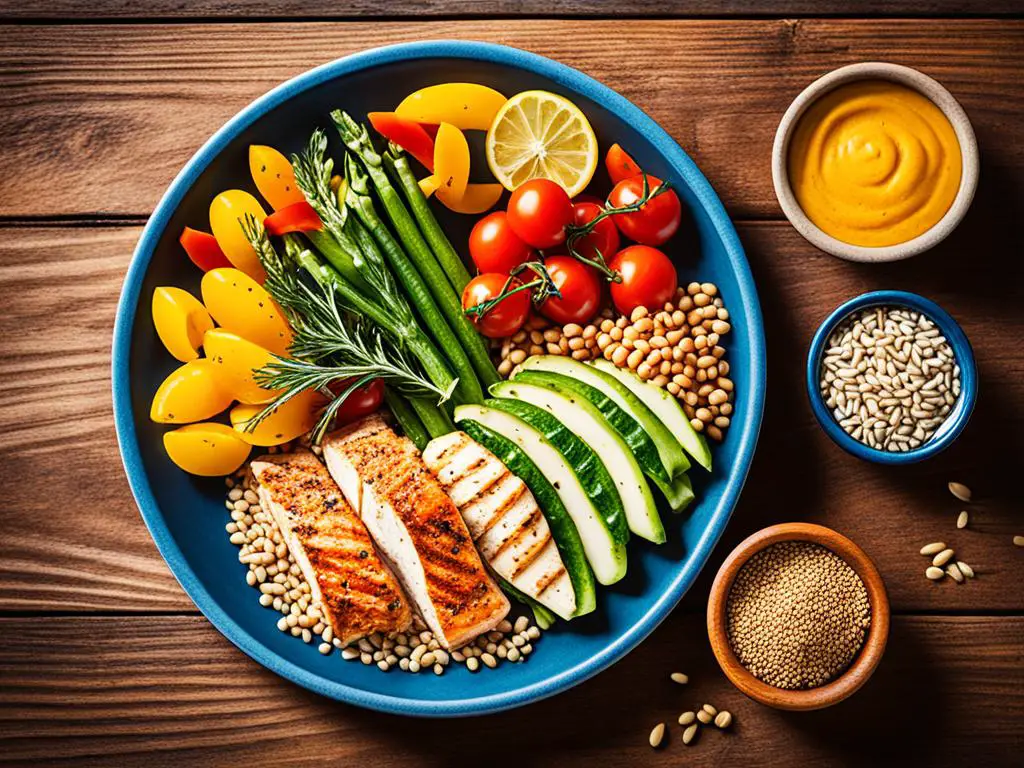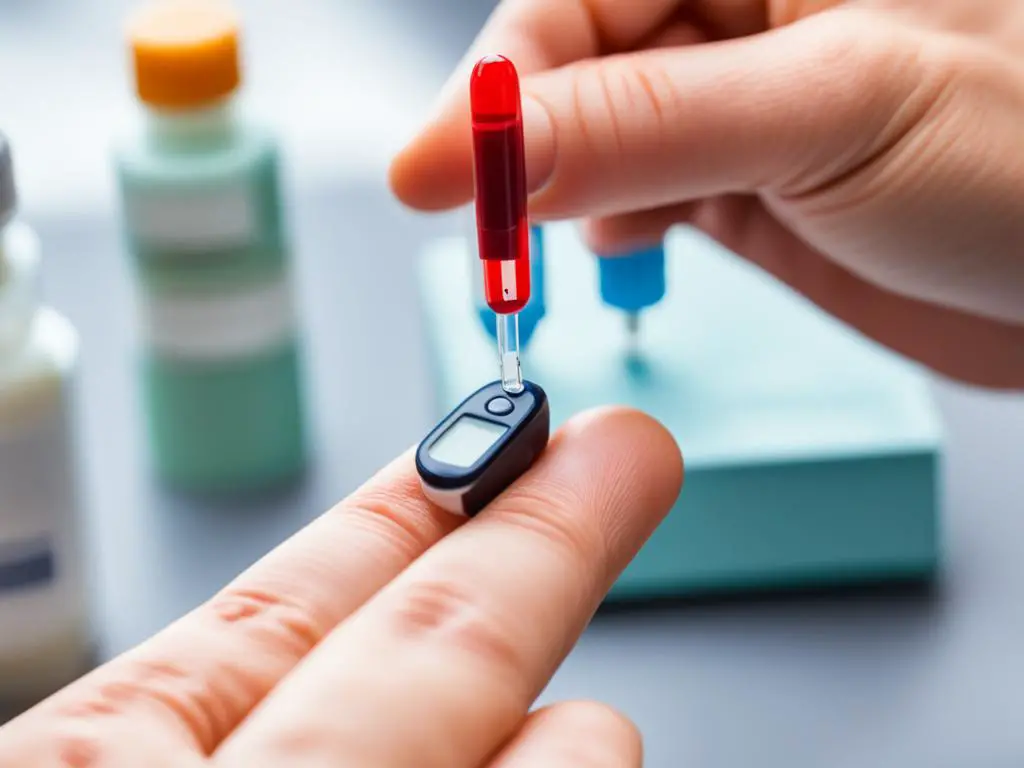For those looking for other ways to handle diabetes, managing it without medicine is an option. By changing your lifestyle and using non-drug methods, you can keep your blood sugar in check and boost your health1. The Centers for Disease Control and Prevention say about 17.7 million Americans with diabetes use medicine to control their blood sugar2. But, eating right, exercising regularly, and reducing stress can also help control sugar levels and lower the risk of complications.
Studies show losing just 5% of your weight can make a big difference in your health1. A study with 5,145 people with type 2 diabetes found losing 5 to 10 percent of weight made them three times more likely to lower their A1C levels2. Keeping a healthy weight with good food and exercise can help you manage diabetes without just using medicine.
Key Takeaways
- Natural diabetes management is possible through lifestyle modifications and holistic approaches
- Losing 5-10% of body weight can significantly improve blood sugar control and overall health
- Regular exercise and a balanced diet are crucial components of non-pharmaceutical diabetes control
- Stress reduction techniques can aid in managing diabetes naturally
- Working closely with healthcare professionals is essential for successful alternative diabetes treatments
Understanding Type 2 Diabetes
Type 2 diabetes is a long-term condition marked by high blood sugar levels. This happens when the body’s cells don’t respond well to insulin. Insulin is a hormone that helps glucose enter the cells. As cells resist insulin, the pancreas makes more insulin, but it can’t keep up, leading to high blood sugar3.
Causes of Type 2 Diabetes
Insulin resistance is the main cause of type 2 diabetes. It can be due to genetics, being overweight, not moving enough, or eating poorly. When cells don’t take in insulin well, glucose builds up in the blood, causing type 2 diabetes. Eating right and staying active can help prevent or slow down type 2 diabetes3.
Symptoms of Type 2 Diabetes
Symptoms of type 2 diabetes can start slowly over years. They include:
- Increased thirst and urination
- Fatigue
- Blurred vision
- Increased hunger
- Slow healing of sores or wounds
- Numbness or tingling in the hands or feet
- Unexplained weight loss
- Dry skin
- Frequent infections
If not treated, type 2 diabetes can cause serious problems like heart disease, kidney damage, nerve damage, and vision issues. Checking blood sugar levels often and making healthy lifestyle changes can help manage type 2 diabetes. This includes eating well and being active for at least 150 minutes a week43.
Lifestyle Changes for Managing Diabetes
For people with type 2 diabetes or at risk, healthy lifestyle choices are key. A 2020 article found that healthy habits can help manage or even put type 2 diabetes into remission5.
Maintaining a Healthy Weight
Keeping a healthy weight is vital for diabetes management. A 2018 study showed that a weight management program helped half of 306 type 2 diabetes patients go into remission after a year5. Losing weight can lower blood sugar levels to a healthy range5.
Following a Balanced Diet
The American Diabetes Association suggests eating lean meats, fruits, vegetables, and fewer processed foods5. A balanced diet includes these nutrient-rich foods, no matter your preferred cuisine5.
Incorporating Regular Exercise
Exercise is crucial for managing diabetes. The CDC recommends 150 minutes of moderate activity weekly to control blood sugar5. People with diabetes should do at least 30 minutes of activity daily to manage their blood sugar6.
Managing Stress Levels
Stress can worsen type 2 diabetes, affecting blood sugar levels, according to 2019 research5. Managing stress through deep breathing, meditation, or yoga can help control blood sugar6.
Quitting smoking is also key for diabetes management, as it raises the risk by 30–40% and worsens related health issues56. Regular doctor visits, at least twice a year, are important for those with diabetes to prevent complications6.
Dietary Approaches for Diabetes Management
Managing diabetes through diet is effective for weight loss and better blood sugar control. Carbs are key because they turn into sugar in the body, affecting blood sugar levels7. So, planning meals well is important for those with diabetes.

The Mediterranean Diet
The Mediterranean diet is full of fresh fruits, lean proteins, whole grains, and healthy fats. It’s linked to a healthy weight and lower risks of heart disease, depression, and dementia. This diabetes diet focuses on foods that keep blood sugar stable and boost health.
Low-Carbohydrate Diets
Low-carb diets, like the Atkins diet, make the body use fat instead of glucose for energy. They cut out sugar, pasta, and grains, focusing on meat, fish, eggs, and veggies. While these diets can help with weight loss, research shows they don’t greatly differ from balanced diets in weight loss or heart health for people with diabetes8.
Meal Replacement Plans
Meal replacement diets use shakes and soups to help with weight loss and manage diabetes. They control calorie intake and can be a good short-term plan. But, switching to a balanced diet is key for long-term success.
Adults with diabetes should try to get at least 150 minutes of moderate exercise each week7. Exercise, along with a healthy diet, can greatly improve diabetes management and overall health.
The best diabetes diet is one that fits your lifestyle and health goals. Working with a dietitian can help, as it has been shown to lower A1C levels by 1.0–1.9% for type 1 diabetes and 0.3–2.0% for type 2 diabetes8. Making smart food choices and staying active can help manage diabetes and improve life quality.
How to Manage Diabetes Naturally Without Medication
Managing diabetes without medication means changing your lifestyle, checking your blood sugar often, and getting help from doctors. These steps help keep your blood sugar in check and lower the risk of problems related to diabetes.

Monitoring Blood Glucose Levels
Using a portable glucometer at home helps manage blood sugar levels9. It’s key to watch your sugar levels closely. This shows how different foods and activities affect your sugar levels. By spotting patterns, you can adjust your life to stay healthy and lower diabetes risks.
Implementing Lifestyle Modifications
Eating right is key to managing diabetes. Foods like starchy veggies, whole grain bread, and beans help keep your sugar stable10. Eating foods with a low glycemic index, such as bulgur and beans, can also help lower your blood sugar9. Plus, eating lots of fiber-rich foods helps your body control blood sugar better9.
Exercise is also vital for diabetes care. Activities like running or walking can lower your blood sugar right away10. Regular workouts, like weightlifting and biking, make your body more sensitive to insulin and help control your weight, which is key for blood sugar control9.
Handling stress with exercise, meditation, or deep breathing can also help keep your blood sugar stable9. Getting 7 to 8 hours of good sleep each night is also important for keeping your blood sugar and insulin levels in check9.
Seeking Support from Healthcare Professionals
Even with lifestyle changes, getting help from doctors is crucial. They should set a target HbA1c and help you reach it. If your HbA1c is under 48mmol/mol or 6.5% for six months without meds, you’re in remission. Talk to a doctor if you’re curious about managing type 2 diabetes without meds.
Experts say to try a balanced diet, regular exercise, and stop smoking to manage type 2 diabetes without meds.
By checking your blood sugar, making lifestyle changes, and getting doctor advice, you can manage diabetes naturally. These steps not only control your blood sugar but also boost your health and lower diabetes risks.
Conclusion
Managing type 2 diabetes naturally is possible with a holistic approach. This includes making lifestyle and dietary changes. By understanding the link between obesity and diabetes11, people can work on keeping a healthy weight. This can be done through regular exercise12 and eating a balanced diet12.
Eating foods like fruits, vegetables, whole grains, lean proteins, and low-fat dairy helps a lot12. Certain diets, like the Mediterranean diet, can also help manage diabetes13.
It’s important to manage stress, get enough sleep12, and check blood sugar levels. Supplements like chromium, cinnamon, and zinc12 can also help. Always work with health experts to create a plan that fits your needs.
There’s no single way to manage diabetes naturally. Different diets, such as low-fat and vegetarian, can help control blood sugar13. By sticking to these changes, people with type 2 diabetes can manage their condition without medication. With effort and support, they can improve their health and quality of life.
FAQ
Q: What lifestyle changes can help manage diabetes naturally?
A: Managing diabetes naturally means making healthy choices. This includes keeping a healthy weight, eating a balanced diet, and exercising regularly. It also means managing stress and checking your blood sugar levels often. These steps can help keep your blood sugar in check and might even cut down on medication.
Q: What are the symptoms of type 2 diabetes?
A: Type 2 diabetes can show symptoms over time. These include feeling tired, drinking more water, and needing to pee more. You might also see blurry vision, feel hungry even when you eat, or have slow-healing cuts. Other signs are numbness in your hands or feet, losing weight without trying, dry skin, and getting more infections.
Q: How can the Mediterranean diet help manage diabetes?
A: The Mediterranean diet is all about eating fresh fruits and veggies, lean proteins, whole grains, and healthy fats. It uses herbs and spices instead of salt. This diet can help you stay at a healthy weight and lower the risk of heart disease, depression, and dementia. These are common problems linked to diabetes.
Q: Can low-carbohydrate diets be effective for managing diabetes?
A: Yes, low-carb diets like the Atkins diet can help manage diabetes. They make your body use fat instead of sugar for energy. By eating less sugar, pasta, and grains, and more meat, fish, and veggies, you can control your blood sugar and lose weight.
Q: What is the importance of monitoring blood glucose levels in managing diabetes?
A: Checking your blood sugar is key to managing diabetes. It shows how different foods and activities affect your sugar levels. By spotting patterns, you can adjust your diet and exercise to keep your blood sugar healthy. This can prevent serious health problems.
Q: How can individuals achieve diabetes remission without medication?
A: To get diabetes in remission without pills, focus on a balanced diet, regular exercise, and stop smoking. Losing weight can also help control your blood sugar. If your HbA1c level stays below 48mmol/mol or 6.5% for six months without medication, you’re in remission.
Q: What role do healthcare professionals play in managing diabetes naturally?
A: Doctors and nurses are key in helping you manage diabetes naturally. They create a plan just for you, set goals for your HbA1c levels, and guide you on lifestyle changes. They also check on your progress to help you reach diabetes remission without medication.
Source Links
- https://londondiabetes.com/news-and-events/curing-diabetes-naturally-without-medication/ – Curing Diabetes Without Medication | London Diabetes Centre
- https://www.hopkinsmedicine.org/health/conditions-and-diseases/diabetes/managing-diabetes-six-healthy-steps-with-the-most-benefit – Managing Diabetes: Six Healthy Steps with the Most Benefit
- https://my.clevelandclinic.org/health/diseases/21501-type-2-diabetes – Type 2 Diabetes
- https://www.niddk.nih.gov/health-information/diabetes/overview/managing-diabetes – Managing Diabetes – NIDDK
- https://www.medicalnewstoday.com/articles/how-to-control-type-2-diabetes – Managing type 2 diabetes with and without medication
- https://www.webmd.com/diabetes/diabetes-lifestyle-tips – 6 Lifestyle Changes to Help Control Your Diabetes
- https://www.mayoclinic.org/diseases-conditions/diabetes/in-depth/diabetes-management/art-20047963 – Diabetes management: How lifestyle, daily routine affect blood sugar
- https://www.ncbi.nlm.nih.gov/books/NBK279012/ – Dietary Advice For Individuals with Diabetes – Endotext
- https://www.healthline.com/nutrition/14-ways-to-lower-blood-sugar – 14 Natural Strategies to Lower Blood Sugar Levels
- https://www.piedmont.org/living-real-change/why-its-possible-to-live-medication-free-with-diabetes – How to Live Medication-free with Diabetes
- https://www.medicalnewstoday.com/articles/323627 – Diabetes: Symptoms, treatment, prevention, and early diagnosis
- https://pharmeasy.in/blog/how-to-control-diabetes-without-medicine-the-research-backed-lifestyle-changes-that-can-help/ – How to Control Diabetes Without Medicine: The Research-Backed Lifestyle Changes That Can Help – PharmEasy Blog
- https://www.uptodate.com/contents/type-2-diabetes-and-diet-beyond-the-basics/print – Patient education: Type 2 diabetes and diet (Beyond the Basics)
